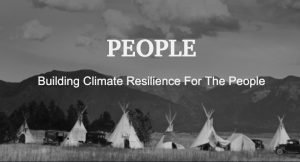
The Confederated Salish and Kootenai Tribes (CSKT), a combination of the Salish, the Pend d’Oreille and the Kootenai, was founded and federally recognized in 1855. “We’ve been here much, much longer,” reflects member Mike Durglo, “since the mountains were hills and bison roamed the prairies by the millions.” From their ancestral homeland on the Flathead Indian Reservation in Montana, CSKT are leaders in the fight to preserve the natural environment, revive indigenous practices, and fight climate change. They face mounting challenges — warming waters that starve trout of oxygen, snowpack vanishing weeks too soon, flames that devour centuries-old forests, and foreign plants that strangle native medicine gardens. One of the first tribes in the U.S. to develop a climate strategy, CSKT integrates Indigenous knowledge with scientific data. Their comprehensive Climate Change Strategic Plan prioritizes actions across nine categories of tribal life: forestry, land, fish, wildlife, water, air, infrastructure, people, and culture.
With just one staff member and a team of volunteers, CSKT has become a national leader in climate resilience for its nearly 7,800 enrolled members — 5,000 of whom live on their 1.2-million-acre reservation. They maintain extensive water and air quality programs with monitors in all seven schools and health facilities across the reservation. Their annual Earth Day and Youth Summits engage the community, while their Tribal Climate Adaptation Guidebook and Indigenous Knowledge resource guide for the Department of the Interior have earned national recognition. CSKT shares expertise through climate workshops with tribal nations nationwide and is currently assessing their carbon footprint, sponsored by the Bureau of Indian Affairs. At their 18,500-acre Bison Range, a weather station captures real-time data on temperature, rainfall, soil moisture, sunlight, and snow depth as part of the Native Drought Resilience initiative. They’re building tribal climate leadership, strengthening community resilience, and advancing their long-term environmental vision for generations to come.

Mike Durglo, CSKT Climate Coordinator, helped create the Department of Interior’s landmark Indigenous Knowledge handbook, bringing traditional ecological wisdom into federal climate policy through his journey from tribal member to national advisor. Photo: Mike Durglo
